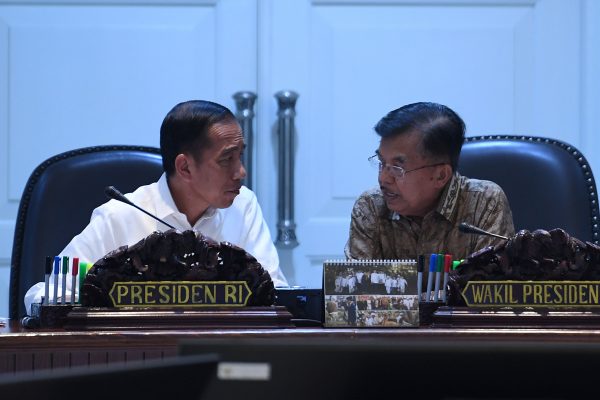Indonesia’s current foreign policy reflects old Cold War views and objectives, especially that Indonesia should be neutral in ideological bloc contestation because taking sides could jeopardise its sovereignty. But the current great power competition in Asia is not powered by ideology, but by geopolitical and geoeconomic interests. This means it is unlikely that a middle power like Indonesia can effectively pursue outdated non-bloc pragmatism amid the evolving regional security architecture. The Joko ‘Jokowi’ Widodo government must see nonalignment as a means, not an end.
Concerning the ongoing Russia–Ukraine war, Jokowi’s foreign policy shows little geopolitical awareness. For example, Indonesia’s military exercise with the United States in early August 2021 was followed by China and Russia holding a similar largescale activity. Sutiyoso, a retired general and political ally of Jokowi, said it was ‘important to signal that Indonesia was not leaning toward China’, but why did non-aligned Jakarta not take a similar military approach to China and Russia? In part, because Indonesia’s military elites distrust their Chinese counterparts.
On 3 March 2022, Indonesia also supported the UN General Assembly resolution condemning the Russian invasion of Ukraine. But it did not explicitly mention Russia — just the need to pay attention to the humanitarian conditions in Ukraine. Foreign Ministry officials defended the stance to back Ukraine by referring to nonalignment, economic interests and international reputation — especially within the G20. Yet Indonesia also insists that Russian President Vladimir Putin attend the planned G20 summit in late 2022.
It is difficult to pinpoint which national interests are being pursued within the G20 forum. If Indonesia had to keep investments and trade ties with Russia under the bilateral comprehensive economic partnership agreement, it’s unclear why Jakarta joined others in standing against Moscow at the United Nations. Indonesia has nothing at stake for not supporting Ukraine. But, Defence Minister Prabowo Subianto is currently making a huge military procurement from the United States and some NATO members. This goes some way to explaining the westward policy.
Jokowi has no strategic doctrine. During his first five-year term in 2014–2019, foreign policy grappled with the discourse of the Indo-Pacific, projecting Indonesia as a global maritime fulcrum (GMF). But during his second tenure from 2019, Jokowi is not including the GMF outlook in the state’s international priority list. Instead, he puts economic diplomacy at the top, followed by improving Indonesia’s contributions to global multilateral institutions.
Indonesia has missed the significance of geopolitical considerations in its foreign policy without the GMF. Its proposal for the ASEAN Outlook on the Indo-Pacific drew upon the idea that Indonesia, with its location at the crossroads of the Indian and Pacific Oceans, should play a constructive role in creating a rules-based order amid competition between China and the United States.
The maritime vision is gone, replaced by Jokowi’s technocratic, economic-oriented foreign relations and image-building ambitions. Perhaps Jokowi envisions a more global role, mainly through the G20. It appears that he wants to leave a similar international leadership legacy to his predecessor Susilo Bambang Yudhoyono a decade ago.
Ambiguity and ambivalence will present a big problem. The multitude of consequences of the war in Ukraine on the increasingly polarised world is unpredictable. At the same time, Indonesia’s international activism is not guided by a grand strategy. Jokowi, Prabowo and foreign-policymakers must rethink the meaning and implementation of the real ‘bebas aktif’ — or independent and active foreign policy.
Jakarta must make its position known. Nonalignment may be safer for Indonesia to continue economic cooperation with China and Russia. Simultaneously, it could boost military ties with the United States and other Western powers. But in the long run, two scenarios have to be considered. First, Indonesia could take a firm stance to align with a particular great power for its economic and military links and assistance. Second, it could create a new bloc to navigate between the great powers. Although these policy options are not new, in light of recent developments Jakarta’s options are worthy of discussion.
Both options suit the principle of bebas when Indonesia chooses based on its own national interests, not decisions dictated by external parties. It is aktif when Indonesia not only watches the power games but also tries to establish its own path in the Indo-Pacific order-building. Non-bloc strategies must be devised to achieve Indonesia’s foreign policy goals, not chased as the goal itself.
I Gede Wahyu Wicaksana is Senior Lecturer of International Relations at Universitas Airlangga, Surabaya, Indonesia.

